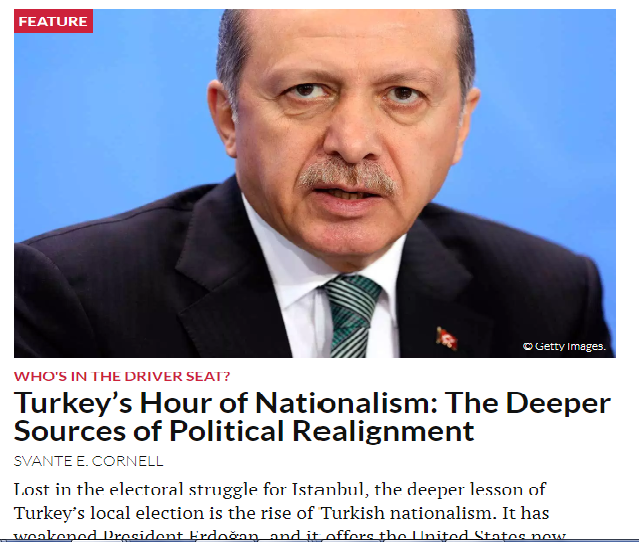The March 31 local election in Turkey was a bombshell: Contrary to expectations, President Recep Tayyip Erdoğan’s Justice and Development Party (AKP) lost not only the capital Ankara, but the country’s biggest metropolis, Istanbul, where Erdoğan himself rose to prominence as Mayor in the 1990s. The Supreme Electoral Council’s May 6 decision to cancel the Istanbul election and order a June 23 rerun was equally significant. To many, it amounted to the final nail in the coffin of Turkish democracy. EU Turkey rapporteur Kati Piri said it“ends the credibility of democratic transition of power through elections.”
Staff Publications
Turkey's Hour of Nationalism: The Deeper Sources of Political Realignment
US Perspectives on China's Belt and Road Initiative in Central Asia and the South Caucasus
US Perspectives on China's Belt and Road Initiative in Central Asia adn the South Caucasus
By S. Frederick Starr
Abstract
To date, the US response to the Chinese Belt and Road Initiative (BRI) in Central Asia and the Caucasus has been calm, if not tacitly supportive. Two main reasons for this are: (a) the reopening of age-old east–west trade corridors as one of the most important legacies of the collapse of the USSR and (b) it views the engage- ment of both China and Europe in east–west trade across Central Asia as fur- thering the Central Asians’ own ability to achieve balanced and positive relations between all the major powers, thereby constraining hegemonic aspirations from any quarter. Further, the United States supports the emergence of Central Asia as a defined world region akin to ASEAN or the Nordic Council and believes that reforms under way in Uzbekistan and elsewhere in the region serve that end as well as increase east–west and west–east trade across the region. Finally, the United States realizes that the ultimate judgement on the viability of BRI in Central Asia and the Caucasus will be that of the market and not geopolitics.
The Rise and Rise of the Turkish Right
The Rise and Rise of the Turkish Right
By Halil M. Karaveli
The opposition parties challenging President Recep Tayyip Erdogan offer another version of the right-wing nationalism of his party and its nationalist partner.
The New York Times, April 8, 2019
Since March 31, the defeat in Turkey of President Recep Tayyip Erdogan’s Islamic conservative Justice and Development Party, the A.K.P., and its ultranationalist electoral partner Nationalist Movement Party, the M.H.P., in municipal elections in Ankara, Istanbul and several others cities has led to premature commentary that Turkey is on the verge of change.
U.S. Strategy Towards Afghanistan and (The Rest of) Central Asia
U.S. Strategy Towards Afghanistan and (The Rest of) Central Asia
By S. Frederick Starr, S. Enders Wimbush
Americanl Interest, January 24, 2019
From Europe to Asia, everything is in motion. Russia’s growing weakness as a state tempts it more than ever to employ its refurbished military in risky adventures. China faces an unfamiliar fragility at home and pushback to its policies abroad. India is rising but must still make up for decades of clumsy domestic policies. Pakistan has a growing middle class but is failing nonetheless. In Afghanistan, a talented new generation is rising but solutions to decades of turmoil require constant replenishing. The people of Iran are once again flirting with revolution. Turkey is lurching towards an Islamic and neo-Ottoman identity, and has in the process upended most conventional thinking about its strategic importance. The European Union’s process-driven raison d’être appeals to fewer and fewer citizens of the nations it hoped to homogenize. And the Middle East continues to breed the pathologies that have characterized it for a century.
The West Has an Opportunity, Yet Again, to Push Back Against Russia
By Mamuka Tsereteli
The West Has an Opportunity, Yet Again, to Push Back Against Russia
November 28, 2018
Turkish-Saudi Rivalry: Behind the Khashoggi Affair
TURKISH-SAUDI RIVALRY
Behind the Khashoggi Affair
The conflict between Turkey and Saudi Arabia is about more than just geopolitics. It’s about ideology—and survival.
The Myth of Erdogan's Power
By Halil Karaveli
The Myth of Erdogan's Power
August 2018
Landmark Caspian Deal Could Pave Way for Long-Stalled Energy Projects
By Mamuka Tsereteli
Landmark Caspian Deal Could Pave the way for Long-Stalled Energy Projects
September 2018
The West Should Stand Stronger with Georgia
By Mamuka Tsereteli
The West Should Stand Stronger with Georgia
August 2018
Erdogan Wins Reelection
By Halil Karaveli
Erdogan Wins Reelection
What the Campaign Revealed About the Future of Turkish Politics
June 2018



